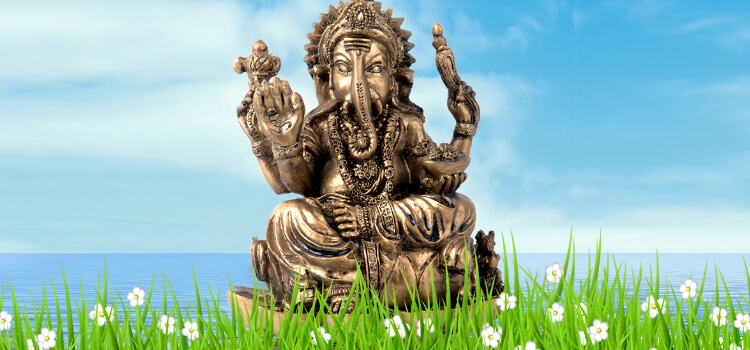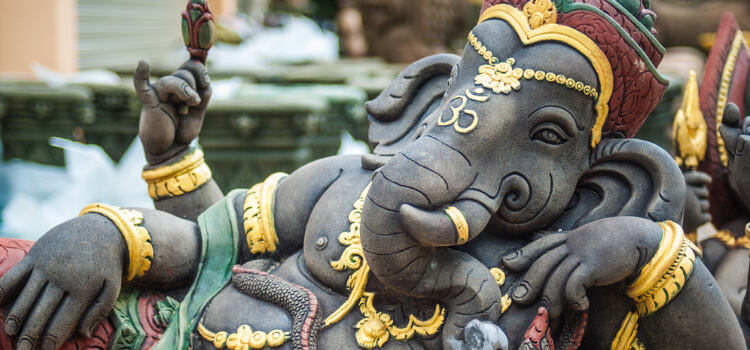Why Gods Love Flowers?
Since time immemorial, we have offered flowers or leaves to gods and goddesses while worshipping them. Each deity may have particular favorites. For instance, Lord Vishnu likes Tulsi while Shiva prefers Bilva and Ganesha, hibiscus and Durva grass. Gods and Goddesses reside in the astral world and their bodies have more of the air element, which gives them a good sense of smell. Hence they love pleasant smells. In the word puja, pu- means ‘flower’ and –ja means japa or chanting the name of the lord. The scriptures have always recommended ‘pushpanjali’ as a way to please the lord. When we perform a ritual, we are in essence, invoking the Gods/Goddesses to come down to earth from their heavenly abode by offering them things that they like. These could be flowers, food, perfumes, etc. Lured by the pleasant fragrances of these articles, they descend on earth and are pleased to grant us our wishes and prayers.
Nature of Flowers
The color and smell of each flower bestows it with its own particular power of attraction. Religious scriptures divide flowers into three types – sattva, rajas and tamas. While the first two can be offered daily, tamasic flowers like kasa grass, china rose, cotton plant and ketaki, should be offered only on special occasions. Usually, five leaves or flowers are to be offered, representing the panchabhootas or the five elements of nature.
The Science Behind Offering Flowers
It is believed that flowers, leaves, perfumes and other aromatic substances absorb positive and divine vibrations from the atmosphere. This helps in sanctifying the Pooja area and infusing the surroundings with divine energies. Mango leaves, especially, are good at absorbing divine energies from the atmosphere. Hence people often tie a bunting of mango leaves or toran, over the Pooja area. This is also why nine or eleven mango leaves are kept around the coconut that is placed at the mouth of the kalash (pot) used for Poojas. Even the number of flowers and special leaves is important. Some Gods must be offered three red flowers while others are offered five or nine yellow or white flowers, along with leaves of a particular tree. Different flowers are associated with different deities and they attract the principle of the concerned deity. It is the color and fragrance of the flowers which give them the power to attract the principles of the deity, thereby benefitting the worshipper.

Lord Ganesha – the God of Knowledge
Lord Ganesha is a very popular deity. He is regarded as the supreme manifestation of Brahman who removes all impediments and helps us to achieve victory in all our endeavors. He is also the pranava swarupa or the embodiment of AUM, the primordial cosmic sound. Invoking him before embarking on any activity will ensure success.
Flowers that Please Ganesha
Red flowers are dear to Ganesha. Offerings of red flowers will earn his blessings. Other flowers preferred by Ganesha include:
Arka/erukku/milkweed – The flowers of this plant are used to ward off ailments. Both the leaves and the flowers are used to worship Ganesha and Shiva.
Punnaga/Punnai – The Lalita Sahasranama mentions this flower and sings its praises. The flower is believed to be auspicious for worshipping Ganesha. Devotees who make an offering of this flower while doing puja for Ganesha will be cured of all kinds of ailments, physical and mental.
Vakula/mahizham – These flowers are usually strung into garlands and they exude a very nice fragrance. Offering these flowers to Ganesha relaxes your mind and fills it with peace.
Japaa/hibiscus – This flower is very dear to Ganesha. In Sanskrit, the flower is called japakusuma. By offering hibiscus, one can find prosperity. It also has the power to destroy your enemies.
Kadamba – The flowers of this plant bloom in small yellow clusters. It is associated with goddess Parvati. Those who want to acquire talent and skill can offer this flower.
Dhadimi/ mathulai poo – It is the flower of the pomegranate plant. Its leaves and flowers are used to worship Ganesha. It can bring wealth and prosperity.
Jathi malli – Also called winter jasmine, these flowers are very fragrant. Those who have a troubled married life, with constant fights and arguments can offer these flowers to lord Ganesha for a happy married life.
Parijatha/pavizhamalli – As it blooms only at night, the flower is called ‘queen of the night’. Another name is coral jasmine. The petals are shed during the day. The flowers have a very unique fragrance. Its stalk is red in color and the petals resemble those of the jasmine flower. If you want your children to do well, offer this flower to Ganesha.
Kundha/mullai – Commonly known as nithya mullai, it is a perennial. Offer the flowers if you want resolution of long-standing court cases. It also helps unite family members who are separated.
Arali/oleander – Arali flowers come in 3 colors – red, pink and white. Offering these flowers is believed to guarantee victory over enemies. It also helps achieve success in examinations and gain profits in business.
Saughandika (Javandhi) – This plant is a perennial and has a lovely fragrance. Those who wish to ward off evil eyes, the bad effects of black magic and negative energies can offer these flowers to Ganesha.
Kalhaara/red water lily – This flower is very auspicious and finds pride of place in most pujas. If you wish to have a life of comfort and luxury, offer this flower.
Ketaki/Thazhai/screw pine – One usually finds these flowers growing in profusion along river banks. But they are not used in Shiva puja.
Champak – The champak flower is used in the worship of Ganesha as well as the Devi. Yellow in color and sweet smelling, it is also a favorite of Lord Krishna. One will have the good fortune to marry the person one loves if one offers this flower to Ganesha.
Techi or Chethi Flower – Its other names are ‘flame of the woods’ and ‘jungle flame’. It has the power to remove sorrow and poverty. Offering this flower attracts positive vibrations.
Sanku Pushpam or Conch Flower – This flower comes in shades like blue, purple and white. It is also called aparajitha. Those who desire an early marriage can offer this flower.
Marigold Flowers/chendumalli – They are also used to decorate temples. Those who offer this flower to Ganesha can hope to be free of chronic diseases and acquire good health.
Durva Grass – This is very important to Lord Ganesha. Blades of this grass are offered in all rituals and pujas to Ganesha. It is a sacred grass that earns you his divine grace.
Datura – Its Sanskrit name is umathai and it is commonly found growing as a weed in open grounds. Those who suffer from loss of reputation, slander and curses will do well to offer this flower to Ganesha.



I don’t think the title of your article matches the content lol. Just kidding, mainly because I had some doubts after reading the article. https://accounts.binance.info/register?ref=P9L9FQKY
Your article helped me a lot, is there any more related content? Thanks!